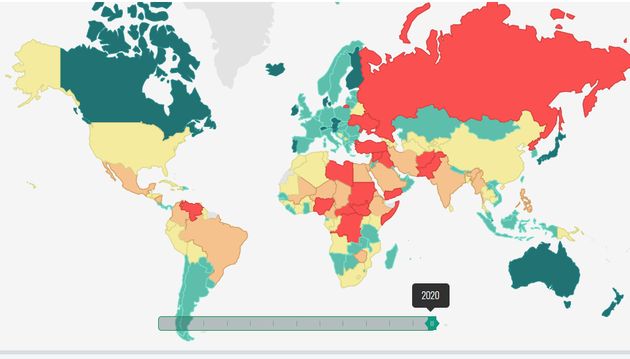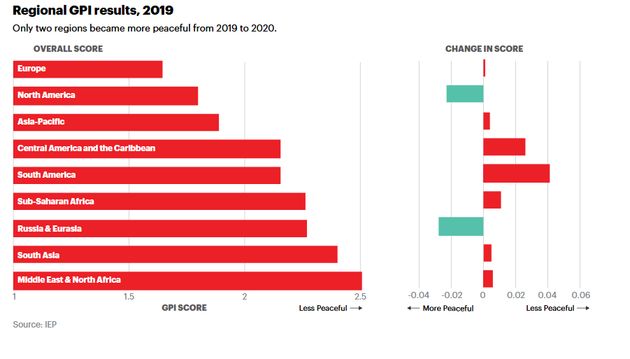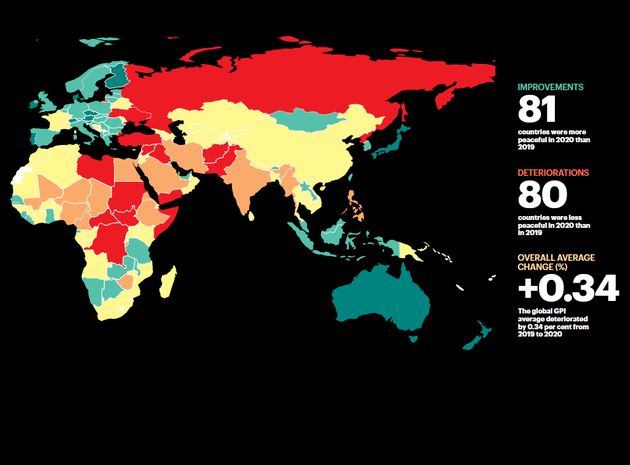“Europe is the world’s most peaceful region”, Global Peace Index says. “As Christians, our contribution to peace is to be a reflection of Jesus”, the leader of Anabaptists and Mennonites in Spain, says.
![French soldiers patrolling the streets of Paris. This has been a common image in different European capitals following the rise of terrorism. / [link]Fabien Maurin[/link], Unsplash CC0.](https://cms.evangelicalfocus.com/upload/imagenes/5f295cad21b1d_fabienmaurin.jpg) French soldiers patrolling the streets of Paris. This has been a common image in different European capitals following the rise of terrorism. / [link]Fabien Maurin[/link], Unsplash CC0.
French soldiers patrolling the streets of Paris. This has been a common image in different European capitals following the rise of terrorism. / [link]Fabien Maurin[/link], Unsplash CC0.
The Institute for Economy and Peace has recently published the Global Peace Index (GPI), an assessment of the state of peacefulness around the world.
The GPI analyses data such as the access to the purchase of weapons, the number of homicides, the violent demonstrations, the local political instability, the military expenditure, or the number of displaced persons.
“The results this year show that the level of global peacefulness deteriorated, with the average country score falling by 0.34%. This is the ninth deterioration in peacefulness in the last twelve years, with 81 countries improving, and 80 recording deteriorations over the past year”, the Index points out.
Furthermore, “the 2020 GPI reveals a world in which the conflicts and crises that emerged in the past decade have begun to abate, only to be replaced with a new wave of tension and uncertainty as a result of the COVID-19 pandemic”.
“The world is now considerably less peaceful than it was at the inception of the index. Since 2008 the average level of country peacefulness has deteriorated 3.76%”, they add.
According to the GPI, “the fall in peacefulness was caused by a wide range of factors, including increased terrorist activity, the intensification of conflicts in the Middle East, rising regional tensions, increasing numbers of refugees and heightened political tensions in Europe and the US”.
“Europe remains the world’s most peaceful region, despite recording a very slight deterioration in peacefulness on the 2020 GPI".
According to the GPI, “Sixteen countries recorded improvements in peacefulness, with 19 having deteriorations. European countries account for 17 of the top 25 countries in the 2020 GPI, with Iceland being the highest ranking country in the region and also globally”.

[photo_footer]Gloal PeaceIndex map / GPI. [/photo_footer] Meanwhile, “Turkey remains the least peaceful country in Europe. It had a slight deterioration in peacefulness on the 2020 GPI, falling to 150th on the overall GPI rankings”.
“Despite being the world’s most peaceful region, Europe has experienced political and economic unrest over the past year [..} The full extent of the economic and political ramifications of the pandemic remains to be seen, but relations between countries in Europe have been strained by the response to the virus”.
“The lack of peace is related to the increase in inequalities in most of the world. For example, in the United States the inequality index between rich and poor has grown by 36% between 1980 and 2018. The same is happening in many countries”, explains Kenny Clewett, the director of Ashoka Hello Europe, an organisation that works refugees and migrants, and Phd in theology.
For Clewett, “in Europe and around the world, we are seeing worrying increases in structural discrimination, leaving groups that were already very oppressed even further from the opportunities to fully participate in the society. Without justice there is no peace”.
“As a society, we have not yet understood that we are all connected, and that an injustice against a group, even if it is not ours, affects us all”, he adds.
The Anabaptists, Mennonites and Brothers of Christ in Spain (AMyHCE), which brings together some of the leading Protestant denominations in peace work, also consider that “a large part of violence is rooted in inequalities and social injustice”.
“Natural frustration is exacerbated because there has been a worldwide increase in national-populist identity proclamations, which are used as the main response to that injustice or inequality, despite being a false response that does not go to the economic and social roots of the problem, but it simplistically designates another group as guilty”, they add.
David Becerra, Secretary General of AmyHCE, stresses that “the deterioration of peace can be attributed to the fall into sin that we read in the book of Genesis, which brings some selfish longings that lead us to sacrifice others for our own benefit”.
“When this becomes a generalized attitude, it leads to the creation of increasingly hedonistic, individualistic and self-centered societies that react violently to frustration”, he explains.

[photo_footer] Regional GPI results./ GPI. [/photo_footer]
Four of the five countries where, according to the GPI, peace is more seriously affected (Afghanistan, Syria, Iraq and Yemen), also appear in the top fifteen places on the persecuted Christians World Watch List of Open doors.
“The peace that Jesus practiced was not a monastic utopia or a peace linked exclusively to individual well-being. It was a concrete way to respond to oppression and to confront oppressors”, emphasizes Becerra.
According to the Secretary General of AmyHCE, “Jesus disarmed many, giving answers that were a public complaint and offered the oppressors an opportunity to think and rethink their situation of abuse”.
Clewett points out that “those who use the term utopia more to refer to peace are those who least have to deal with injustices. Christianity offers a radical vision of peace, which is possible here and now”.
“Jesus spoke of an impending kingdom and offered peace here and now for his followers, not as a distant future concept. Although it begins with an individual transformation that reconciles us to God, it does not end there, but rather leads us to proclaim and seek justice and peace in our society”, he adds.
For Clewett, “seeking the leadership of Christians who suffer injustice the most, as part of the process of seeking peace, is a central part of the mission of the church, and must be a key part of our daily theology, preaching, liturgy and practices”.
Clewett recalls that “historically, groups of Christians have fought against injustice to stop practices such as letting children die in Rome or transatlantic slavery”.
According to the Global Peace Index, “the economic impact of violence on the global economy in 2019 was $14.5 trillion in purchasing power parity (PPP) terms, which is equivalent to 10.6% of the world’s economic activity (gross world product) or $1,909 per person”.

“In the ten countries most affected by violence, the average economic impact of violence was equivalent to 41% of GDP on average, compared to under 4% in the countries least affected by violence”, the GPI says.
Becerra underlines that “as Christians, the great contribution we can make for peace is to be a reflection of Jesus. As a church, we are called to reflect its character, its values, and its practice. Likewise, we have to be bread, comfort and shelter for those who suffer. Not reflecting Jesus should not be an option for his disciples”.
“Believing in a just and merciful God, allows us, first, to identify injustices and demand changes. Second, by serving a merciful God, we can live a life of repentance, which is the basis of reconciliation”, the Secretary General of AmyHCE, adds.
Becerra warns that “many Christians generate violence by provoking or being lukewarm in the face of inequality or poverty”.
“Our congregations are segregated. There are very troubling levels of poverty in many churches, while in others funds are abundant, and they are not helping each other. There is no peace between brothers, we need to fix this”, Clewett stresses.
According to the director of Ashoka Hello Europe, “the process begins by listening to those who are suffering, to identify injustices, to intentionally repent of our participation in that injustice, and to look for ways to restore and resolve it internally and publicly”.
“We can proclaim the kingdom of God and his justice in very specific situations, even if it bothers us or brings us problems, and even persecution or violence. We can work for reconciliation, even if it is difficult”, Clewett concludes.
You can read the full PI report here.

Las opiniones vertidas por nuestros colaboradores se realizan a nivel personal, pudiendo coincidir o no con la postura de la dirección de Protestante Digital.
Si quieres comentar o